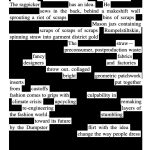A Robin at the Bus Station
Newly loose with death,
I can imagine her stomach, the give.
I bring her an oyster shell from the shore,
prop her head. A pine branch blanket.
You taught me how to care for the dead like this,
how to get quiet in their moment,
early January, no other willing witness.
It’s big work. And even I step away,
whisked back to life by the bus,
where in front of me a young man
video chats his girlfriend, who cries
the entire hour-long ride as he slumps
further into his seat, humming short responses.
A whole bus of us listen to her pleas,
and despite her foreign tongue
I can feel the ruptures, the cold valleys.
I press a warm thumb into the sea
spinning past the window. Bleached shell,
pine branch, stuttering connection.
With these tired hands, we can only
build beds, soft spaces to land.
Fall in Languedoc
Officials in Japan are running out
of storage space for the ocean water
used to cool down Fukushima’s
nuclear cores. Tens of thousands
of tons, all newly radioactive,
with talks of releasing it all back
into the ocean. Across the globe,
we fill a tractor load—two or three
tons of grapes—in four hours
with a team of eight. What would
a hundred tons of our juice look like;
a thousand? I try to measure the ruined
water in tractorfuls, but run out of room
in my mental valley. How diluted
does a radioactive ocean have to be
before it stops killing everything
it laps up? How much longer
will the waters stand us?
Here, the Hérault’s been low
all summer, thirsty, only two storms
filling her throat. The gorges dried,
scratchy. Her rocky bottom cuts
into my kayak’s belly, though
the carp are fat, the seaweed
an impenetrable forest. Here, slung
between the map’s bright red pins
that mark each nuclear throne,
I imagine the steel drums planted
beneath us, beating out a cold,
toxic tune. The foxes are hungry.
Tourist-trained, they visit us
at picnic hour, panting, patient,
catching grapes in their skinny mouths
swarmed by flies, fleas trampolining
from their fur as they polish
avocado peels of their fatty linings.
From a too-hot summer, the vines
have fried, harvest light this year.
The last fat bulbs were stripped
in the night by wild boars, though
Christian is diligent in his midnight
rounds, has caught half a dozen
perpetrators already. At lunch time,
he brings me their pink meat
in a small Tupperware, cut
neatly into strips.
